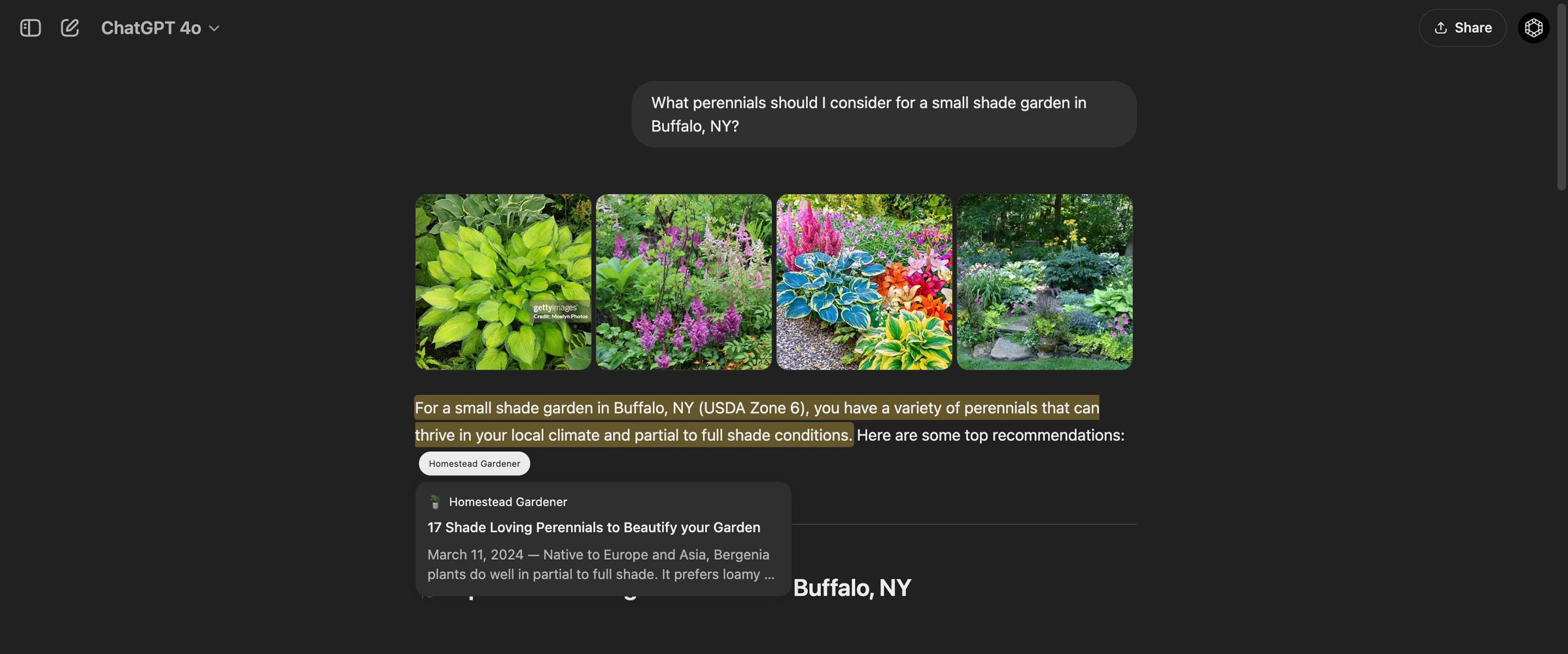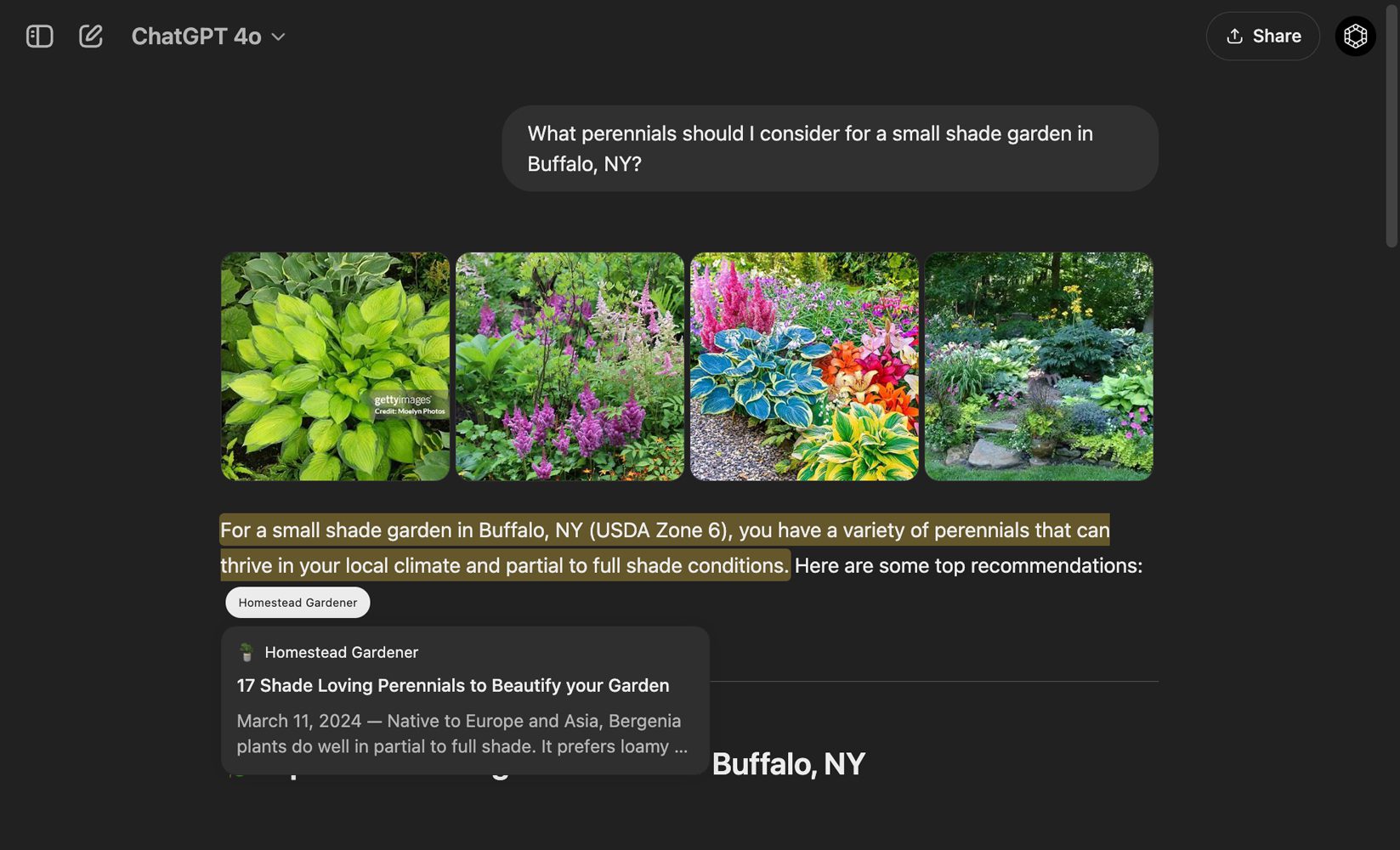We spend a lot of time looking at our clients’ website traffic data because it tells us so much about how potential customers find and interact with a business’s content online. Monitoring user behavior on a weekly, monthly and yearly basis helps us understand what’s working best for our clients and identify shifts in user behavior that could impact our clients. In the second half of 2024, we began to see referral traffic from chatgpt.com in Google Analytics, which made a lot of sense—we were starting to use the AI engine to figure out why our backs hurt, where to go for a weekend getaway and what to name our kids. We were also starting to include ChatGPT in our content ideation and research processes.
Now, well into 2025, website traffic from AI platforms is accelerating as adoption increases. Even though conversational AI platforms like ChatGPT and Perplexity AI are designed to answer questions within their interfaces, they can (and do) drive both website traffic and conversions.
From our perspective, these platforms currently behave a lot like zero-click searches, which keep searchers on Google’s results pages.
Learn more: Why SEO still matters in a zero-click world
What Business Owners Should Know
How people find the information they need online is changing. If your business relies on website traffic as part of the customer journey, you can’t ignore AI platforms.
- ChatGPT cites sources in line with relevant answers. It takes a single click to get to the cited source. However, not all information is paired with a source. A user can also click to expand all sources in a sidebar.
- If you see website traffic from an AI platform in Google Analytics, it means someone ended up on your website from that platform, not just that you were cited as a source.
- Referral traffic generally means a more informed website visitor, regardless of whether it’s from an AI platform or another source. Your website was mentioned as a place to find additional information, which may even mean the website visitor is further into the marketing funnel than a user from an informational Google search.
- ChatGPT isn’t the only AI platform to watch. People are using Perplexity AI, Gemini and Claude, as well as models from Meta and X. However, ChatGPT shows up most often in our clients’ referral traffic right now. We can’t say for sure why this is, but it’s likely a combination of several factors, including usage, how it cites sources and its inability to completely answer some types of questions.
- Website users from AI platforms remain a tiny part of total traffic. Organic and paid search, social media and other referral sources still dominate our clients’ website data. But this piece of the pie is growing, more rapidly for some industries than others.
- How people find information is always changing. While AI platforms may feel like a big shift from a Google search circa 2010, there’s no need to panic. Instead, it’s time to adapt what you know best to this new way people solve problems.
Adapting to AI-first Search
Parkway has always approached SEO content as a way to answer the questions potential customers are searching for online. With this mindset, adapting content to AI platforms doesn’t seem so daunting. We’re still creating high-quality content that helps people make informed decisions about the products and services they choose, regardless of how they find that information. Yet… it would be negligent of us to just keep creating and publishing content without any regard for how AI platforms source and summarize information from around the web.
Digital marketing tools are beginning to monitor what and how brands are cited as sources in conversational AI to give us more insight into what prompts may have led to referral traffic from an AI platform. In the meantime, a deep understanding of your industry and target audience is really important. This knowledge allows us to use ChatGPT as if we’re a potential customer, asking questions about a product or service to guide purchase decisions. This helps us understand how AI engines use our clients’ websites and content, as well as their competitors’.
Creating AI-friendly Content
AI platforms are pretty new and their capabilities are changing quickly, as is how people use them. We’re learning what works and what doesn’t as we adapt to AI-first search.
On Google, almost half of searches are navigational, which means people are using Google as a way to get to a website or webpage they don’t know the URL for. That doesn’t happen nearly as often on AI platforms, where a larger percentage of prompts are informational. As powerful as AI is (and it’s only getting better), it doesn’t have the perspective that comes with decades of experience. In order to work, AI platforms need to “learn” from reputable and reliable sources, like an experienced business’s website. We see this as an opportunity to provide helpful content based on our clients’ unique expertise.
The conversational nature of generative AI lets people ask increasingly specific questions and dive deeper with personalized follow-ups. Unlike Google, where people search using short phrases, detailed prompts are the best way to get what you need from ChatGPT. If your business can speak to these niche topics with in-depth original information AI can synthesize and cite, AI search is an opportunity to connect with your people.
Lastly, we’re reframing what role content plays in the marketing funnel. While AI platforms can absolutely deliver high-quality leads for your business, just showing up as an informative source within an answer from ChatGPT or Perplexity AI can increase brand awareness. We’re keeping an eye on changes in direct traffic and organic searches for a business’s name, which can indicate a website visitor is already familiar with the business from another source (like ChatGPT or social media) and ready to make a purchase.


